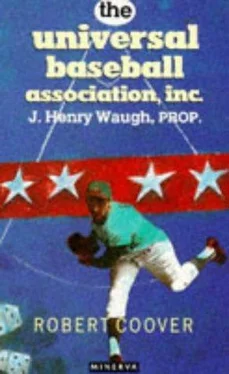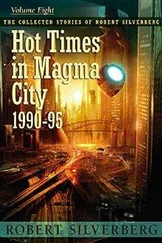Robert Coover - The Universal Baseball Association, Inc., J. Henry Waugh, Prop
Здесь есть возможность читать онлайн «Robert Coover - The Universal Baseball Association, Inc., J. Henry Waugh, Prop» весь текст электронной книги совершенно бесплатно (целиком полную версию без сокращений). В некоторых случаях можно слушать аудио, скачать через торрент в формате fb2 и присутствует краткое содержание. Год выпуска: 1992, Издательство: Minerva, Жанр: Современная проза, на английском языке. Описание произведения, (предисловие) а так же отзывы посетителей доступны на портале библиотеки ЛибКат.
- Название:The Universal Baseball Association, Inc., J. Henry Waugh, Prop
- Автор:
- Издательство:Minerva
- Жанр:
- Год:1992
- ISBN:нет данных
- Рейтинг книги:3 / 5. Голосов: 1
-
Избранное:Добавить в избранное
- Отзывы:
-
Ваша оценка:
- 60
- 1
- 2
- 3
- 4
- 5
The Universal Baseball Association, Inc., J. Henry Waugh, Prop: краткое содержание, описание и аннотация
Предлагаем к чтению аннотацию, описание, краткое содержание или предисловие (зависит от того, что написал сам автор книги «The Universal Baseball Association, Inc., J. Henry Waugh, Prop»). Если вы не нашли необходимую информацию о книге — напишите в комментариях, мы постараемся отыскать её.
The Universal Baseball Association, Inc., J. Henry Waugh, Prop — читать онлайн бесплатно полную книгу (весь текст) целиком
Ниже представлен текст книги, разбитый по страницам. Система сохранения места последней прочитанной страницы, позволяет с удобством читать онлайн бесплатно книгу «The Universal Baseball Association, Inc., J. Henry Waugh, Prop», без необходимости каждый раз заново искать на чём Вы остановились. Поставьте закладку, и сможете в любой момент перейти на страницу, на которой закончили чтение.
Интервал:
Закладка:
"I just don't understand you anymore, Henry!" Lou protested. There was an awkward silence as they walked along under the drumroll of rain. "Look, Henry, I got an idea, why don't you come along with me tonight? I found a new place, Mitch's Bar and Grill, great steaks—"
"Sorry, Lou, I'm busy tonight."
"That's what you always say, Henry. What do you do? I don't understand. Look, I got an idea—"
"Not tonight, Lou." They were at the front door of Diskin's Delicatessen. Maybe tonight was the night to show Lou the game. Yet, damn it, somehow he felt jealous of that perfect game, felt an uncommonly strong wish to be alone this evening, and besides, Lou could spoil it. His questions were almost never the right ones. "Some other time. I may want to go out and celebrate soon, in fact."
"Celebrate. .?"
"Would you like to use my umbrella, Lou? the rest of the way?"
"No, thanks, Henry, I catch a bus on the next corner and it's… but, but listen—"
"Say, Lou," Henry interrupted as he turned into the doorway of the stairs leading up to his apartment. "Is Mitch a first or last name?"
"Mitch? You mean the…? First, but…?"
"What's his last name?"
"Porter, I think."
"Mitch Porter." Henry collapsed his umbrella and stood at the edge of the rain, listening to the name of Mitch Porter. Might make an outfielder. Or a good third baseman. "We'll have to try it sometime. Good night, Lou."
Lou sighed. "Night, Henry." His friend Lou looked dismal in the rain, hat brim adroop, eyebrows soggy, and if it hadn't been for the recording of the perfect game that awaited him, Henry would have relented, would have taken leave from the Association tonight and gone with Lou to Mitch's Bar and Grill, try to cheer him up. And, yes, someday, no doubt about it, he'd have to show Lou the game. If he didn't get it, so what? At least let him have his chance.
The stairway always had a certain smell that quickened Henry's pulse. Like hot dogs and beer in a ball park. Probably came from the delicatessen, but in any case it always made Henry take the last ten or fifteen steps on the run. At the door of his apartment, he was often grabbed by mild panic, felt the fragility of this thing he'd fashioned: a fire, theft, even a hard wind… he drove the key into the lock, turned it, stepped inside.
But on the kitchen table, everything was in order, just as he had left it. Scorecard of the game, final entries scrawled a little excitedly perhaps. The dice still showed Hard John Hor-vath's grounder to third. In a sense, it was still that moment, and if he wanted to savor it or if he got occupied with something else, it could go on being that moment for weeks. And then, when things got going again, would the players have any awareness of how time had stopped? No. . but they might wonder how all the details of that moment had got so firmly etched in their minds.
Of course, there were other games yesterday. The lowly Excelsiors had risen up to knock off the league-leading Knickerbockers, 6-to-2, trimming their edge over the surging Pioneers to two games. The Pastime Club, riding a winning streak, had edged the Keystones in the ninth inning, 4-to-3, to tie that team for third place and give troubled Tim Shad-well another white hair. And, in a second-division free-for-all, Winslow Beaver's Beaneaters had nailed Wally Wickersham's bumbling Bridegrooms deeper into the cellar, 12-to-8, both teams using five of their six pitchers in the hectic course of the game. The first thing Henry did after hanging up his hat, coat, and umbrella, was to bring the Team Standings Board up to date. The Board, which years ago Henry had constructed with removable wooden name-slats and numbers, hung on the wall behind the kitchen table. When he was done, it read:

Then he put on fresh coffee and switched on the light, a hundred-watt bulb with a green metal topee, painted white on the underside, that hung directly over the table. Next, he got out the binder of running pitching statistics for this year, filled in the details from the forty-seventh round of games. Henry had the forms for these statistics, like all his forms now, printed up for him by a small-job printer. There was room on each form for a full team of six pitchers, and there, with little marks that ended up looking like railroad tracks, he recorded their Games Pitched, Complete Games, Games Won, Games Lost, Shutouts, Strikeouts, Walks, Hits Allowed, Innings Pitched, Earned Runs Allowed, and Special Remarks. There were spaces for writing in, at year's end, the Won-Lost Percentage and Earned Run Average.
The coffee was done, so he poured himself a cup, returned now to the table to post the day's batting statistics. These charts were larger, had room for a full roster of twenty-one players (pitchers had batting averages, too, of course, and a couple of pitchers in UBA history had, in spite of the odds against them, hit their way into Star categories and become right fielders in the course of time), contained such information as Games Played, At Bats, Runs, Hits, Doubles, Triples, Home Runs,
Runs Batted In, Stolen Bases, and so on, with special columns to record Injuries, as well as Most Valuable Player points, awarded after each game. Room, too, for end-of-season Batting and Slugging Averages. As for injuries, these occurred with a dice roll of 3-3-3 on all nine of the basic charts; the dice were then thrown again to obtain the details of it from the special Injuries Chart, which included everything from a hit batsman who, uninjured, took his base, to multiple injuries that sometimes kept ballplayers out of the line-up for several games, or even the season. It was every manager's headache and it was probably the worst way to lose a pennant, to have your Ace nursing a chip in his elbow or your Stars hobbling around in casts, but it was a crucial part of the whole game, and though Henry always felt a twinge of remorse when it happened, he was pleased with that detail in his system.
Finally, the dullest job — recording of fielding statistics. The trouble was, all these averages stayed pretty much the same, and worth was a hard thing to judge by them. Incompetent ballplayers just didn't make it up to the big leagues in the first place, and as for the competent ones, a couple percentage points here or there didn't tell much of a story. He had managed to bring a little color and pattern to them with small subtleties worked in over the years, such that brilliant fielders took more chances, made fewer errors, had a better chance of throwing out base runners from the outfield or setting up double plays, but except for a handful of unusually flashy glovemen, he couldn't keep his mind on it. He had thought of giving them up altogether, they took a lot of time and didn't seem worth it, but there were all those fielding records already established, and what would they mean if they had no challengers? Besides, it was, as Sandy Shaw knew, the third part of the game: "… Pitchin', catchin', swingin', out on the field all day! " So he had stayed loyal even to this, the most wearying part of his game.
This done, the posting of all statistics from the day's play, Henry turned to the job he enjoyed most — writing it up in the Book. He'd begun the logs in Year IX, feeling the need by then to take counsel with himself, though even before that, he had been writing up uncommonly exciting moments on loose sheets of typing paper (glad he did; these later got bound in). Now it consisted of some forty volumes, kept in shelves built into the kitchen wall, along with the permanent record books, league financial ledgers, and the loose-leaf notebooks of running life histories. He seemed to find more to write about, the more he played the game, and he foresaw the day when the number of archive volumes would pass the number of league years. He always used a standard-size record book, three hundred pages, good rag content for durability; he kept a shorthand point on his fountain pen and never used anything but permanent black ink, except when he underlined or boxed in extraordinary incidents or insights in a draughtsman's red ink. On the title page of each volume were the volume number and these words:
Читать дальшеИнтервал:
Закладка:
Похожие книги на «The Universal Baseball Association, Inc., J. Henry Waugh, Prop»
Представляем Вашему вниманию похожие книги на «The Universal Baseball Association, Inc., J. Henry Waugh, Prop» списком для выбора. Мы отобрали схожую по названию и смыслу литературу в надежде предоставить читателям больше вариантов отыскать новые, интересные, ещё непрочитанные произведения.
Обсуждение, отзывы о книге «The Universal Baseball Association, Inc., J. Henry Waugh, Prop» и просто собственные мнения читателей. Оставьте ваши комментарии, напишите, что Вы думаете о произведении, его смысле или главных героях. Укажите что конкретно понравилось, а что нет, и почему Вы так считаете.












